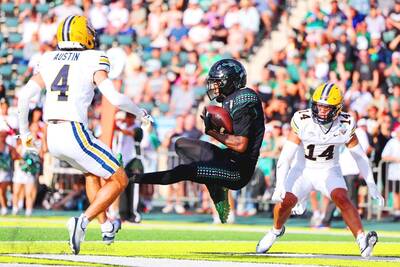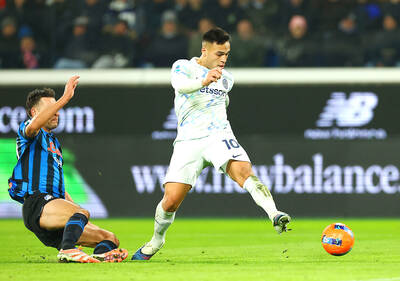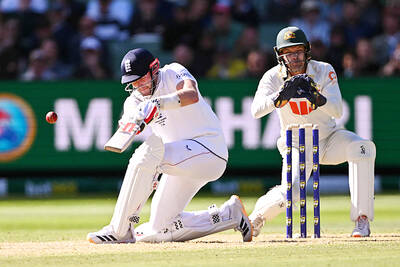Sepp Blatter yesterday defended the decision to bring the soccer World Cup to Africa for the first time, saying any organizational problems would be overcome and downplaying fears over crime.
Speaking ahead of the qualifying draw for the 2010 tournament, the president of soccer's world governing body FIFA said the World Cup could help solve the social ills of the hosts South Africa by acting as a catalyst for development.
"After having meetings with the organizing committee and local organizing committee, we are very confident that we are still going strong towards the realization of a wonderful event," Blatter told reporters in Durban.
Strikes have dogged the program to build or revamp the 10 stadia which will host the tournament but Blatter said he had spoken with some of the workers and was sure that any industrial disputes could be resolved.
"The World Cup is the biggest event in the world of sport and that's normal there are problems ... but all problems have a solution," he said.
Asked whether the tournament was diverting funds needed to develop South Africa in the post-apartheid era, Blatter acknowledged some people would prefer the money to be spent differently but that was not the view of the majority.
"Football can help solve these problems," Blatter said "The Republic of South Africa has made a big, big effort twice to organize this competition."
"If a country is asking to organize a World Cup they know exactly what it means when they want to go in this big, big competition," he said.
The killing of an Austrian tourist over the weekend in Durban has again underlined fears over safety for visitors in a country where around 50 people are murdered every day.
But Blatter said such a tragedy could occur anywhere.
"In a city of 3.5 million some crimes are possible like in all other countries. On Friday evening in a bus station or tram station in Zurich a young girl of 16 years old was shot ... crime is everywhere," the Swiss said.
Blatter said the draw in Durban, due to begin at 5pm (11pm in Taiwan), was a key milestone on the road towards the tournament which begins on June 11, 2010.
"It is a great day today, the kick-off of the World Cup, opening the window of South Africa to the rest of the world," he said.
Blatter also expressed concern that future World Cup finals could be overrun by teams full of Brazilians if the growing trend of their soccer players turning out for other national teams is not checked.
"If we don't take care about the invaders from Brazil, then we could have problems at the 2014 and 2018 World Cup finals," Blatter told reporters yesterday.
There has been a growing trend of countries naturalizing Brazilian players and incorporating them into national teams across world soccer.
Countries like Belgium, Costa Rica, Japan, Mexico, Portugal, Spain and Tunisia have used Brazilians in past World Cup finals, including the likes of Deco, Marcos Senna and Luis Oliveira.
In recent years Brazilian-born players have also played in the national teams of countries like Croatia, Macedonia, Equatorial Guinea and Togo, many of them being imported with the specific purpose of strengthening national teams in events like World Cup or continental competition qualifiers.
"If we don't stop the fast naturalization of players in some countries, this will be a real danger," Blatter said. "There [are] 60 million footballers in Brazil but only 11 places in their national team."
In 2004, FIFA stopped a bid by oil-rich Qatar to FIFA to field Brazilian striker Ailton, then playing for Werder Bremen and the top goal scorer in the Bundesliga.

Backup quarterback Luke Weaver on Wednesday night threw a 22-yard touchdown pass to Nick Cenacle with 10 seconds left, as the University of Hawaii rallied for a 35-31 comeback victory over the University of California, Berkeley in a thrilling Hawaii Bowl. Weaver entered the game after Micah Alejado took a hard hit on the previous play. With the Rainbow Warriors (9-4) in range for a tying field goal, coach Timmy Chang took a shot at the end zone, and Cenacle got between two defensive backs and made the contested catch. “How amazing is that?” Chang said. “It’s a program that is built

Hosts Morocco on Friday were held to a 1-1 draw by Mali at the Africa Cup of Nations, ending their world record run of wins and leaving them still to make sure of progress to the next stage. Midfielder Brahim Diaz tucked away a penalty in stoppage-time at the end of the first half, but Mali equalized from the spot midway through the second half through Lassine Sinayoko. Both penalties were awarded after video reviews in a tempestuous clash at the end of a busy day of action at the tournament. Morocco were atop the Group A standings with four points, while Zambia,

STILL IN THE HUNT: Rasmus Hojlund took his goal tally for SSC Napoli to nine as the champions cruised to a win at US Cremonese and stayed two points behind the leaders Inter on Sunday stayed at the Serie A summit after beating Atalanta BC 1-0 to maintain their slender lead over local rivals AC Milan. Lautaro Martinez netted the only goal of the game in Bergamo for Inter, who lead Milan, 3-0 winners against Hellas Verona thanks to Christoper Nkunku’s first Serie A goals, by a single point at the top of the division. The Argentina striker has scored in four consecutive league matches to end what has been a tricky year in positive style. “I ended last season in a lot of pain... I kept going during the Club World Cup and international

An astounding 20 wickets fell on a frantic first day of the fourth Ashes Test yesterday, with Australia all out for 152 before storming back to dismiss England for 110 and leave the clash on a knife-edge. England skipper Ben Stokes won a key toss on a green track and his quicks feasted after sending in the hosts under overcast skies in front of 94,199 fans at the Melbourne Cricket Ground. It was the biggest cricket crowd ever at the cavernous arena, exceeding the 93,013 who watched the 2015 World Cup final, and they witnessed the home side collapse with Josh Tongue